Your Planets
Portraits of the Planets
Aspects between Planets
The planetary ages
The planetary families
Planets in Signs
The Planets in comics
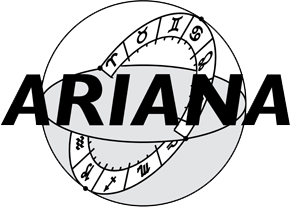

In a letter addressed to Alain de Chivré following my article on C. G. Jung and conditionalist astrology appeared in the Lettre des Astrologues, André Barbault pretends to “discover” that Jean-Pierre Nicola would have passed “sort of from Pavlovian astrology to Jungian astrology” and finds that it makes him “still a pleasure to witness such a rapprochement, the Sign taking place next to the signal”.
This sudden and late discovery is a little strange, given that the table of correspondences between Jungian types and zodiac signs which accompanied my article was never more than a systematic formatting of the correlations exposed by Jean-Pierre Nicola In The Solar Condition, the first conditionalist work published in 1964.
We are thus led to pose the following alternative: either André Barbault has never read this book, nor can he accuse conditionalist astrology of being “Pavlovian” that “jungian”. Or else he read it 40 years ago, and there’s no way he “discover” only now the references to the typologies of Jung that it contains. The second hypothesis being the most probable, one can then wonder if he did not have an extremely selective reading of this book, retaining only the “Signal Pavlov” without seeing the “Symbol-Jung”. He should explain the reason for this voluntary or involuntary blindness, the debate would thus be clearer.
That said, the conditionalist approach to astrology is not more “Pavlovian” than “jungian” and it did not evolve from one to the other, since the references to these two researchers were found from the beginning of conditionalism. It’s not being “Pavlovian” than to note the existence of excitable or inhibited behaviors, of fast or slow temperaments, any more than it is to be “Jungian” than to observe that men have introverted or extroverted sensations, feelings, thoughts and intuitions.
Pavlov discovered the fundamental laws of nervous activity. He is not responsible or the owner, and everyone is free to refer to these laws without being “Pavlovian”, just as anyone can experience the effects of gravity under an apple tree without having to declare oneself “newtonian”. These discovered laws are part of our collective knowledge and everyone can refer to them without being subservient to the individuals who found them.
.png)
.png)
.png)
In my last article devoted to the relations between Jungian thought and astrology in general, and its conditionalist approach in particular, I published a table summarizing the correspondences that Jean-Pierre Nicola established between the characterological typology of Jung and the Conditionalist Zodiac Signs. I was careful to emphasize that these were only relative matches, not absolute identifications. To make this clear, I repeat what I wrote:
“Of course, as Nicola points out, ‘The two systems should not be identified. The nervous mechanism underlies several psychological or intellective manifestations, it concerns the being as a whole and affects all the functions’. This is all the more so since, seen from a strictly astrological point of view, it seems obvious that the Jungian types amalgamate the zodiacal and planetary meanings.”
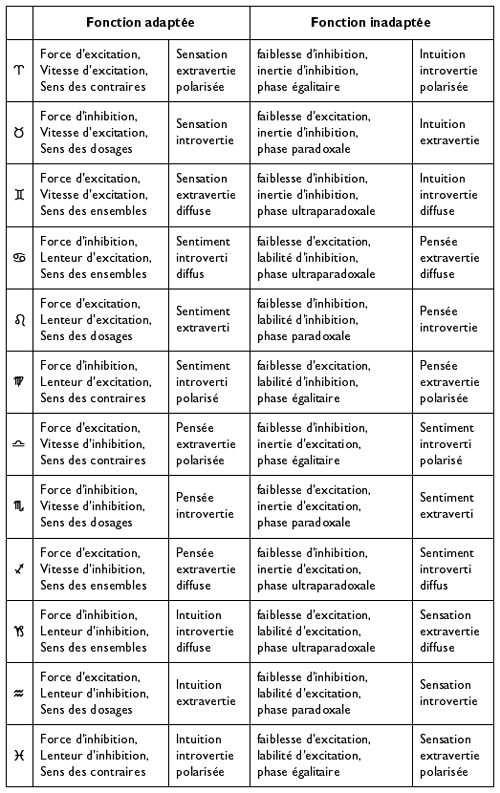
To make this absolute non-identity between the two systems even clearer, here is another quote from Jean-Pierre Nicola taken from The Solar Condition: “The comparison proposed here points out the possible affinities” (emphasis mine), “the elective attractions between a function and a mechanism (I would say today, a process). For example, for the Sensation function the Excitement Speed (of Signs of Spring) is ideal. The Feeling function calls rather the Slowness of excitement (from the Signs of Summer). To the Thought function wish the mobility (Speed) of the inhibition (of the Signs of autumn). The comparison Intuition-Slowness of inhibition (of the Signs of Winter) seems debatable because we call ‘intuitions’ a series of phenomena confused with the signals of instinct or feeling. Intuition, the real one, can only come after the complete course of the cycle (therefore, last fourth).”
This being said, it may seem simplistic and arbitrary to stick to “possible affinities” between Jungian typology and Signs of the zodiac. Well Named, André Barbault recalled the primacy of the planetary over the zodiac in his article on Jungian typology published in 1988 in No. 82 of the journal L’Astrologue. Here is what he wrote: “The wandering that we have seen continued throughout this quest for correlations of Jungian typology, also results from an unfortunate choice, unfortunately still dominant in today’s practice: the adoption of a ‘zodiacal astrology’ to the detriment of traditional planetary astrology”.
On this specific point, and on no other, I completely agree with him (I quote him again): “it is the planet in itself that is the prime mover. The astrological phenomenon first passes through its intrinsic nature. This initial state cannot be forgotten in the movements of its various positions” in the Signs. In the name of the primacy of the planetary over the zodiac, we can therefore legitimately criticize the attribution of Jungian types to the zodiac alone… unless we pretend to forget that The Solar Condition is a book mainly devoted to the zodiac. A precision of size, which makes this criticism lose a lot of legitimacy.
In his letter, André Barbault wrote that he wanted “believe that there will be a sequel — be it at least the presentation of a single case of known notability or verifiable celebrity for each of the twelve Signs to justify this intervention”. I propose, not to accede to his request, but to do even better: to try to establish correlations between Jungian typology and planetary functions.
Let’s start with the second operation. It is tricky to lead. Indeed, the eight “kinds” basic Jungians (obtained by combining Sensation, Feeling, Thought and Intuition to extroversion and introversion) cannot be systematically matched to the ten planetary functions, on the one hand for a numerical reason (given that 10 − 8 = 2, it “would miss” two “kinds” Jungians to cover the planetary spectrum), and on the other hand, and more profoundly, it appears that each of the “kinds” Jungian corresponds to several planetary functions, and that the different characteristics of each planetary function seem to belong to different Jungian types, and this without forgetting that the “kinds” Jungians amalgamate planetary and zodiacal meanings.
The table below summarizes the “planetary families” defined by the R.E.T. system.
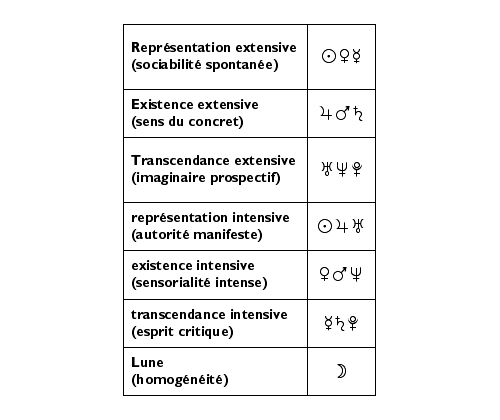
The two systems are therefore not homologous, equivalent, reducible to each other. They describe human functioning from different perspectives, although there are points of similarity in these descriptions. The table below, which I have produced, proposes a system of correspondences between Jungian functions and planetary functions. It is neither a dogma nor a Bible, just a working hypothesis.
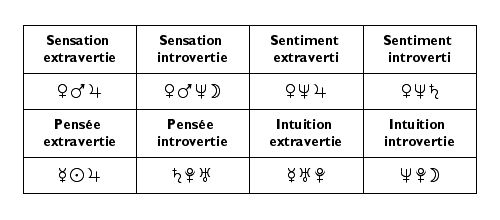
Before attempting to justify these correspondences, I think it is necessary to recall the main psychological characteristics of Jungian functions. The texts describing them are taken from the excellent ABC of Jungian Psychology written by Carole Sédillot (Éd. Grancher).
▶ Extrovert Sensation Function: “Positively, this type shows a very developed concrete and pragmatic sense. He has a reputation for being reasonable because he approaches life in a structured and organized way. We can think that he is balanced because he does not let himself be easily destabilized, anchored as he is to his convictions. He knows how to adapt perfectly to circumstances. He loves the pleasures of existence and does not hesitate to take advantage of them. On the negative, this enjoyer can become unpleasant and rude, lacking finesse and elegance. He finds it very difficult to deprive himself and experiences frustration very badly. His attachment to the object leads him to be tyrannical or dependent on it and to show jealous and possessive behavior.”
This description seems to be a Venus-Mars-Jupiter dominant. The duo Venus-Mars corresponds to the side “enjoyer of the immediate”, attached to the pleasures of the existence of this “type”. The duo Mars-Jupiter corresponds to its realistic, organized and pragmatic side.
Conditionalist astrology: this type covers both families “intensive existence” (Venus-Mars-Neptune) and “extensive Existence” (Mars-Jupiter-Saturn). Neptune and Saturn are excluded: the Extraverted Sensation hardly corresponds to the pole “intuitive” of the neptunian function (source level “Transcendence” in the R.E.T. system), and to the cold and cerebral saturnian distance (target level “transcendence” in the R.E.T. system).
▶ Introverted sensation function: “Favorably, this irrational function allows itself to be guided by events in which it trusts. The individual feels, without being able to explain it, that it is good for him. He orients his choices and decisions according to the intensity of subjective sensory participation, triggered by his interest in the object. He shows himself to be particularly sensitive, moved and touched by objects, sounds, colors, smells… In a problematic way, the relationship between sensation and object manifests itself in a totally arbitrary way, suggesting an attitude perceived as incoherent because motivated by elements that escape the logic of the outside world. The action can be blocked, creating a panic that paralyzes the individual.”
This description seems to fall under a dominant Moon-Venus-Neptune. There moon corresponds to the plastic, receptive side, letting itself be carried away by events. The duo Venus-Neptune corresponds to the intense sensoriality of this type.
Conditionalist astrology: this type falls, in addition to the moon (homogeneity, receptivity, reverie) of the family “intensive existence” (Venus-Mars-Neptune). Mars seems excluded: the Extraverted Sensation hardly corresponds to the active and realistic side of the marsian function (levels-source and goal “Existence” in the R.E.T. system).
▶ Extrovert feeling function: “In his positive perspective, this type is very sought after because he manifests easily and willingly shares his impulses. Very comfortable in the social world he needs, he knows how to listen and be available, his quality of empathy being one of his best assets. He generally feels in tune with the values he has been taught and respects them. Penalized and repressed, this function leads to factitious and egocentric behavior. Ill-defined and therefore ill-directed, feelings become superficial and artificial.”
This description seems to be a Venus-Sun-Jupiter dominant. Venus corresponds to the seductive, sentimental, empathetic side, reacting to pleasures and displeasures. The duo Sun-Jupiter corresponds to the intense need for recognition of this type, as well as to the personal evaluation function of the feeling function.
Conditionalist astrology: this type covers both families “intensive performance” (Sun-Jupiter-Uranus: spectacular affirmation, respect for rules and standards) and “Extensive Representation” (Sun-Mercury-Venus: spontaneous sociability, the need to be immediately recognized). Uranus and Mercury are excluded: the Extrovert Feeling hardly corresponds to the cerebral-rigorous side of the uranian function, nor the playful, casual and fluttering side of Mercury.
▶ Introverted feeling function: “On the positive side, this type has a sense of secrecy and shows great respect for others and their personal values. Reserved and modest, the individual is extremely selective as to the choice of his friends and loves, trust being an essential parameter in the construction of all forms of relationships. He is by nature reserved and quiet. When she finds herself in difficulty, this function suppresses feelings, blocks her emotions and reacts with mood swings with susceptibility. Silence, withdrawal and frustration invade the elements of the Me leading to loneliness and incomprehension.”
This description seems to be a Venus-Neptune-Saturn dominant. Venus corresponds to the affective, sentimental side. Allied to Venus, the duo Neptune-Saturn corresponds to the secret, enigmatic, undulating and complex, subtle and reserved side of this “type”.
Conditionalist astrology: this type covers only one family of the R.E.T.: the “intensive existence” (Venus-Mars-Neptune), associated with Saturn, planet of introspection and internalization. The Venus-Neptune duo corresponds to the nuanced subtlety of feelings; Mars seems excluded from the Introverted feeling function: its reactivity “at close range” does not adapt well. The duo Venus-Saturn goes in the direction of sentimental fidelity (deepening of attachments) or repression of feelings.
▶ Extraverted thinking function: “In positive terms, the art of convincing lies in the skill and ability to find the right word, the right tone and to assess the right moment for forming an opinion in order to share it with others in the hope of find support and approval. The need to communicate and transmit goes through the need for a mutual understanding of the data and values exchanged. The individual is directed according to rigorous rules of conduct. In a problematic way, the idea becomes cloudy and evades extroverted thinking that lacks control and selectivity. Cluttered, the mind is agitated and has difficulty coordinating the information that is jostling, generating inconsistency and lack of discernment in decisions and positions.”
This description seems to come from a dominant Sun-Mercury-Jupiter. The duo Sun-Mercury corresponds to the sociable, communicative side, gifted to play with the language and to diffuse flexibly its ideas and conceptions. Jupiter gives an account of the values to be exchanged and the rigorous rules of conduct. Note that two of the planets corresponding to Extraverted Thinking (Sun and Jupiter) also correspond to Extraverted Feeling. Seen from the side of astrology, what would differentiate Extraverted Thought from Extraverted Feeling would therefore only count for a third: Mercury for the first function, Venus for the second… which amounts to questioning the attribution of Sun-Jupiter to these two Jungian functions. If one does not have the conditionalist tools, it can only be justified from the side “cerebral” of Mercury for the Thought function and for the Sentimental side of Venus for the Feeling function.
Conditionalist astrology: this type covers… as for the Extrovert Feeling function both the families “intensive representation” (Sun-Jupiter-Uranus: the power to convince, to impose one’s ideas) and “Extensive representation” (Sun-Mercury-Venus: spontaneous sociability, the need to be immediately recognized). Uranus and Venus are excluded: extroverted thought requires a flexibility and adaptability of the cerebrality of which the stiff and intransigent seems quite incapable uranian function. Moreover, Venus seems quite foreign to Extraverted Thinking, which does not seem to have any sensory or affective component.
It remains to explain why, according to conditionalism, the “intensive performance” common to Sun and Jupiter can correspond to both Extraverted Feeling and Extraverted Thought, especially since According to Jung himself, Thought and Feeling are opposite functions. To understand this, you have to know that in Jung, the Feeling function is far from being reduced to “love-affection”. For Jung, like Thought, Feeling establishes value judgments… which is a very jupitero-solar specialty (a judgment is a “intensive representation”, a truth that would be definitive). The value judgments of Thought have a rather abstract, cultural character, those of Feeling a rather concrete, sensory character. In both cases, we judge… abstractly and cerebrally if Mercury is alongside Sun-Jupiter, concretely and emotionally (“I like it or I don’t like it”) if it is Venus. The jugement “Thought-Sun-Mercury-Jupiter” would rather lean on the side of the impersonal, that “Feeling-Venus-Sun-Jupiter” on the staff side.
We see it with this example, the astrological system and the Jungian system are not homologous, interchangeable. There are even strong incompatibilities, since totally antagonistic functions in Jung are only partially, if not at all so for astrology, which must each time associate several planetary functions to achieve a “portrait” psychological that more or less looks like a “type” Jungian. No sir Barbault, conditionalist astrology has not become “jungian”, No more than she ever was “trapped in the narrow corridor of reflexology” Pavlovian, as you wrote.
▶ Introverted thinking function: “Lived in a positive way, this type shows real talents to assert his ideas and his concepts because they are the result of a deep reflection. The individual refers to the models that he himself has organized and created by showing himself to be independent, even indifferent to the principles in front of the outside. Its categorial and personal principles prevail over all the other forms proposed. It is selective: quality rather than quantity. On the negative side, there is a risk of isolation, estrangement or even breakdown in relationships due to rigid or dogmatic thought systems, lack of flexibility and adaptation to external ways of thinking.”
This description seems to be a Saturn-Pluto-Uranus dominant. The duo Pluto-Saturn corresponds to the cerebral, researcher, skeptical, worried, refractory, introverted side. Uranus of the will to impose its own models and conceptions in a maximum independence of spirit.
Conditionalist astrology: this Jungian type covers two planetary functions (Saturn and Pluto) belonging to the R.E.T. “intensive transcendence” (Mercury-Saturn-Pluto, target level “transcendence”, synonymous with critical thinking, the search for hidden meaning) and two others (Uranus and Pluto) belonging to the R.E.T. “Extensive Transcendence” (Uranus-Neptune-Pluto, source level “Transcendence”: prospective imaginary). In the first ‘t’ family, I eliminated Mercury because of its too sociable side, too open to discussion: it is not a very good factor of introversion. Neptune is also not part of the correspondences with Introverted Thought because of its too irrational-affective dimension (target level “existence” — the turbulence of the existing, of the lived, of the felt).
▶ Extroverted intuition function: “Positively, the intuitive follows his personal codes and respects them, showing himself detached from those of others. He knows how to commit himself to causes that seem just to him and put himself at the service of ideals of all kinds by showing an enthusiasm that is sometimes contagious. He has a sense of destiny and therefore he is convinced that he is destined to… In his negative side, he scatters and wastes himself. Led by illusory goals in which he unshakably believes, he risks dreaming his life by maintaining an immature and sterile attitude. Totally irresponsible, he shows a worrying detachment for those around him. Driven by chimerical goals, he rushes into situations leading to failures that bring depression and despondency.”
This description seems very clearly to come from a dominant Uranus-Neptune-Pluto, i.e. all the trans-saturnian planets qualified as “collective” or “transpersonal” by symbolist astrology.
Conditionalist astrology: this Jungian type corresponds to only one family of the R.E.T.: there “Extensive Transcendence”, or deployment of the prospective imagination from an unknown (source level “Transcendence”) which, while maintaining itself (Pluto’s formula is “transcendence of Transcendence”) unfolds towards two other target levels: “representation” (Uranus, the conviction of being “intended for”) and “existence” (Neptune, the feeling of being part of a collective).
The prospective imaginary of the “Extensive Transcendence” of Uranus-Neptune-Pluto in conditionalist astrology resembles Jung’s Extraverted Intuition function like two drops of water: in one case as in the other, there is diffusion of a radical otherness and transcendent singularity which intends to to affirm and act by upsetting reality, and even risk of failure by excess of hallucinated prophetism, of extravagant and inconsiderate intuitionism.
The interesting thing here is to notice that only one family of R.E.T. closely corresponds to a Jungian function. This fact clearly demonstrates, it seems to me, that conditionalism is neither homologous nor reducible to Jungism from the point of view of psychological functions.
▶ Introverted intuition function: “Positively, the talents of this type are revealed in creativity and originality. His imagination carries him and exalts him and puts himself at the service of an artistic ideal or not. The extraordinary is obvious and perceived as ordinary. Detached from the object, the individual runs the risk of being misunderstood by the outside world, which generally does not bother him because being taken for an original suits him perfectly. When it is in difficulty, this function flees from responsibilities and positions. Subjected to the confusion of internal perceptions, she locks herself in a delirium leading to extreme situations of inertia or agitation. Common sense no longer having the right to appear, the little inner voice leads to other paths… and leads the individual towards chimerical or utopian objectives.”
This description seems very clearly to stem from a dominant Neptune-Pluto associated with the moon. In the group of “transpersonal planets”, Uranus seems excluded: the uranian is too proactive and concerned about its external impact for that. On the other hand, the plutonian depths, the neptunian states of mind joined to the lunar daydreams seem to correspond well to this “type”.
Conditionalist astrology: this Jungian type again corresponds to only one family of the R.E.T.: there “Extensive Transcendence” of Uranus-Neptune-Pluto, associated with the lunar function which, at the highest level (natural integration of the non-separability of the real), very much resembles Jungian Intuition. There uranian function, too “representative” (target level “representation”) seems too structured, too “clairvoyant” to be able to correspond to this Jungian function… but it could nevertheless.
These new correspondences pose new problems of homology between Jungism and conditionalism. The Uranus-Neptune-Pluto trio can correspond to both extroverted and introverted Intuition… and the Moon, which I have classified in the correspondences with the Introverted Sensation function, is also found in those with the Introverted Intuition function, these two functions being antagonistic according to Jung. Enough to ask questions, if one is not too rational, about the relevance of Jungian concepts… or conditionalist concepts. If we are rational, we know that “comparison is not right”… and then we ask ourselves other, more interesting questions. This is what conditionalist astrologers do.
Summary of correspondence between “kinds” Jungians and astrological planetary functions: there is no obvious and systematic relationship between the two. The “kinds” Jungians, empirically defined, certainly overlap with planetary meanings, but they do not identify with them.
It remains, since this is how I started, to make the connection between the correspondence between the Jungian-zodiac types and the Jungian-planet types, which turns out to be singularly complex. A system of correspondences based on line-by-line comparisons does not necessarily produce a logical and coherent system… especially if, like the conditionalists, one does not believe in Rulerships planetary and Elements.
On the one hand we have a system of zodiacal correspondences and on the other a system of planetary correspondences. As André Barbault (it’s actually only point of view on which I agree with him), I think that the zodiacal is subordinate to the planetary. If we stick to this, a law is obviously essential: the planetary correspondences prevail over the zodiacal ones, and consequently the first sort the seconds.
Therefore, if I wanted to give examples of celebrity charts illustrating the correspondences between Jungian functions and zodiac-planetary functions in the usual astrological fashion, I would have to select those who best illustrate them, which means that I would have to set aside all those, that is to say the majority, which do not illustrate them and which therefore refute the correspondences between, on the one hand, the “kinds” Jungians and the Signs, and on the other hand these “kinds” and the Planets.
Example: Let’s say someone was born with a Venus-Saturn-Neptune conjunction ruling Libra. In the zodiac correspondence system with the “kinds” Jungians, it would be “extroverted thinking”. In the system of planetary correspondence with the “kinds” Jungians, it would be “Introverted feeling”, is exactly the opposite. The planetary taking precedence over the zodiac, one could infer that the “Introverted feeling” planetary would dominate the “extroverted thinking” zodiac. However, this is not the case: a planet does not “dominated” not a Sign, she expresses herself through him. We therefore find ourselves in a logical impasse.
This impasse is however only apparent, since it is only the fruit of a game of analogies and correspondences, that is to say of “comparisons that are not right”. In reality, in their practice of planet-Sign relationships, conditionalists do not use the Jungian typology. The R.E.T. and the reflexological zodiac are tools conceptual and symbolic much more powerful, which make it possible to decode the Jungian typology, while the reverse is not true: the Jungian typology does not make it possible to decode the R.E.T. and the reflexological zodiac.
The reality is that one cannot separate the planet from the Sign it occupies, knowing that the planet is more important than the Sign. From the conditionalist point of view, the planetary functions relate to the level (high, medium or low) of nervous excitability, while the Signs relate to its nature (excitement or inhibition), mobility (speed or slowness) and balance (sense of opposites, of the dosages or some sets). For this reason, the meanings and characteristics of a planet cannot be opposed to those of the Sign it occupies. There is no “dignities” and of “debilitated” zodiac-planets for conditionalism.
Let us return to our Jungian correspondences. To give convincing examples of celebrity charts illustrating these pure analogies, it seems to me that the best thing is to select cases where there are flagrant convergences of correspondences between the dominant planets and zodiacals. These flagrant convergences are logically realized in the following cases:
▶ Extrovert Feeling: Venus-Mars-Jupiter in Aries and/or Gemini.
▶ Introverted feeling: Moon-Venus-Neptune in Taurus.
▶ Extrovert feeling: Sun-Venus-Jupiter in Leo.
▶ Introverted feeling: Venus-Saturn-Neptune in Cancer and/or Virgo.
▶ Extraverted thinking: Sun-Mercury-Jupiter in Libra and/or Sagittarius.
▶ Introverted thinking: Saturn-Uranus-Pluto in Scorpio.
▶ Extraverted intuition: Uranus-Neptune-Pluto in Aquarius.
▶ Introverted Intuition: Moon-Neptune-Pluto in Capricorn and/or Pisces.
To find examples of charts, the problem then arises of the difference in frequency of presence in Signs between the fast planets and the slow planets.
It is not a priori not hard to find celebrity charts falling under Extraverted Sensing, Extraverted Feeling, Extraverted Thinking, since these functions are paired with fast or relatively fast planets like Jupiter. For introverted Sensation, for example, it is already a little more difficult: the last time Neptune was in Taurus was from 1875 to 1888. This becomes frankly impossible for introverted Thought, extroverted Intuition and the Introverted intuition: the last time these triple conjunctions of slow planets occurred in the Signs concerned, Civil Registry did not exist.
Conclusion: it is globally impossible to give obvious examples of charts closely illustrating all the correspondences between Jungian functions and planets in Signs. This is not bad will on my part, but an astronomical reality.
In order not to appear to be slipping away, I could lower the requirement threshold, for example by producing celebrity charts comprising only two of the three planets in Signs corresponding to Jungian functions. But by doing so, I would weaken the concordances between the planetary trios and them. Example: Extraverted Feeling. If we remove Venus, she loses her pleasurable dimension; if we remove Mars, it loses its activist dimension; if we remove Jupiter, it loses its pragmatic-organizing dimension. In all three cases, she no longer looks like herself. The same problem arises for all the other Jungian functions. So that’s not a good solution.
Another possibility: disconnect the planets of the Signs, and take charts whose dominant planets correspond to a precise Jungian function, and whose dominant Sign corresponds to this same function, even if it is not these planets which occupy it.
Example: for the extroverted Intuition, a dominant Uranus-Neptune-Pluto, whatever the Signs where they are, and a planetary cluster composed of fast planets in Aquarius. It’s already better, but it’s more debatable.
In practice, to select examples, it is not possible to do otherwise than to mix the first and the third solution, which greatly distorts the situation, since in the first case, the charts will be supposed to illustrate the correspondence fairly precisely. (which, I remind you, is only an analogy) whereas in the second it will be quite imprecise. Moreover, it is obvious that we will never come across a type “pure”. Pure types do not exist, except in the imagination of a few rare creators of astrological or other typologies.
For all these reasons (which testify to a concern for rigor), plus the one that obliges me to return this article on time, I have neither the time nor the inclination to accede to the request for André Barbault to illustrate these Astro-Jungian correspondences with charts of celebrities. By using the tools I have proposed, everyone can form their own opinion on this subject.
I will content myself with giving four rather characteristic examples:
▶ Extrovert Feeling: Pierre Perret (dominant: Moon-Venus-Mars in Gemini at DS trine Jupiter in Libra at MC). There is no doubt about the singer’s bon vivant and pleasure-loving side…
.png)
.png)
.png)
▶ Introverted feeling: Alain Juppé, (dominant; Venus-Saturn in Cancer at AS, Venus being square to Neptune-Libra at IC). Yes, the current president of the UMP is a great misunderstood … just like the singer Gérard Manset, born shortly after him under the same zodiaco-planetary dominants.
.png)
.png)
.png)
▶ Introverted thinking: Carl-Gustav Jung, (dominant; Saturn opposite Sun-Uranus and square Pluto). Obviously, if Jung had wanted to be Scorpio, the match would have been even better, but fate would have it otherwise. It nevertheless has the three planets corresponding to introverted Thought in its dominants, and it is difficult to recognize it in the extroverted Feeling of Leo… which clearly demonstrates the primacy of the planetary over the zodiac.
.png)
.png)
.png)
Extraverted intuition: Wolfgang Amadeus Mozart. In astro-Jungism deciphered-imagined by a conditionalist, with a Moon-Pluto conjunction in square IC to Uranus in DS, trine to Neptune opposed to the cluster in Aquarius, Mozart would be a perfect illustration of “Extroverted Intuition”. Reread Carole Sédillot’s description of this function: it looks like a portrait of Mozart.
.png)
.png)
.png)
… remembering that conditionalists do not interpret these charts with Jungian conceptual tools, but with conditionalist tools.
1) Those of you who are interested in the problem of comparative typologies can consult the article Taurus in reverse.
Article published in issue No. 21 of the Fil d’ARIANA (April 2004).
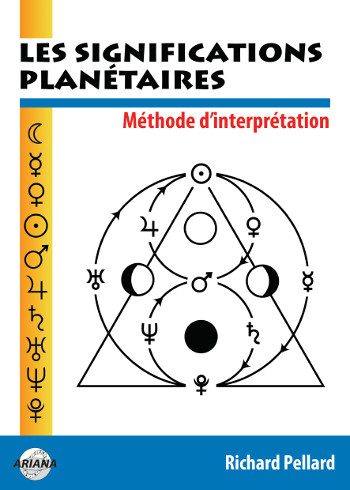
Les significations planétaires
par
620 pages. Illustrations en couleur.
La décision de ne traiter dans ce livre que des significations planétaires ne repose pas sur une sous-estimation du rôle des Signes du zodiaque et des Maisons. Le traditionnel trio Planètes-Zodiaque-Maisons est en effet l’expression d’une structure qui classe ces trois plans selon leur ordre de préséance et dans ce triptyque hiérarchisé, les Planètes occupent le premier rang.
La première partie de ce livre rassemble donc, sous une forme abondamment illustrée de schémas pédagogiques et tableaux explicatifs, une édition originale revue, augmentée et actualisée des textes consacrés aux significations planétaires telles qu’elles ont été définies par l’astrologie conditionaliste et une présentation détaillée des méthodes de hiérarchisation planétaire et d’interprétation accompagnées de nombreux exemples concrets illustrés par des Thèmes de célébrités.
La deuxième partie est consacrée, d’une part à une présentation critique des fondements traditionnels des significations planétaires, d’autre part à une présentation des rapports entre signaux et symboles, astrologie et psychologie. Enfin, la troisième partie présente brièvement les racines astrométriques des significations planétaires… et propose une voie de sortie de l’astrologie pour accéder à une plus vaste dimension noologique et spirituelle qui la prolonge et la contient.
Téléchargez-le dès maintenant dans notre boutique
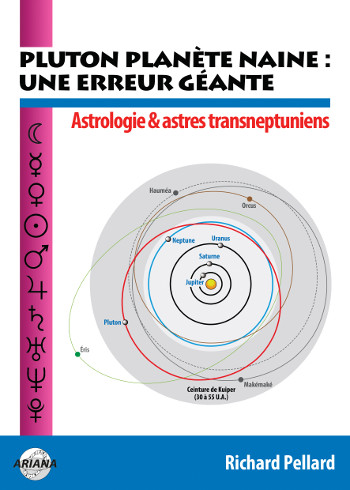
Pluton planète naine : une erreur géante
par
117 pages. Illustrations en couleur.
Pluton ne fait plus partie des planètes majeures de notre système solaire : telle est la décision prise par une infime minorité d’astronomes lors de l’Assemblée Générale de l’Union Astronomique Internationale qui s’est tenue à Prague en août 2006. Elle est reléguée au rang de “planète naine”, au même titre que les nombreux astres découverts au-delà de son orbite.
Ce livre récapitule et analyse en détail le pourquoi et le comment de cette incroyable et irrationnelle décision contestée par de très nombreux astronomes de premier plan. Quelles sont les effets de cette “nanification” de Pluton sur son statut astrologique ? Faut-il remettre en question son influence et ses significations astro-psychologiques qui semblaient avérées depuis sa découverte en 1930 ? Les “plutoniens” ont-ils cessé d’exister depuis cette décision charlatanesque ? Ce livre pose également le problème des astres transplutoniens nouvellement découverts. Quel statut astrologique et quelles influences et significations précises leur accorder ?
Enfin, cet ouvrage propose une vision unitaire du système solaire qui démontre, chiffes et arguments rationnels à l’appui, que Pluton en est toujours un élément essentiel, ce qui est loin d’être le cas pour les autres astres au-delà de son orbite. Après avoir lu ce livre, vous saurez quoi répondre à ceux qui pensent avoir trouvé, avec l’exclusion de Pluton du cortège planétaire traditionnel, un nouvel argument contre l’astrologie !
Téléchargez-le dès maintenant dans notre boutique